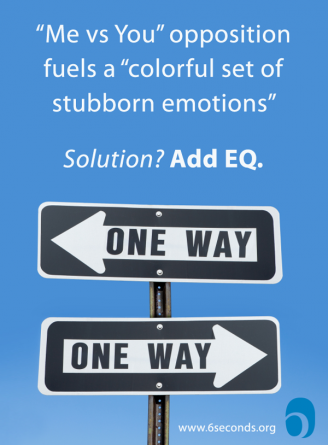How does EQ impact our driving?
You see it every day on our roads: aggressive behavior by ordinary people; sign language; flashing lights; screaming out of windows or stopping to intentionally hurt (or even kill) another driver.
The term “road rage” is commonly referred to as the bad behavior of road users or the loss of emotional control while driving. Road rage is complicated and there is no easy answer to this persistent problem.
To understand road rage, you must first understand what Emotional Intelligence is and how this impacts on actual driving performance.
There is no universally accepted definition for “emotional intelligence” (EI), however EI is generally described as the ability or capacity to perceive, access and manage the emotions of oneself and understanding that of others.
Emotional intelligence taps into a fundamental element of human behavior that is distinct from intellect. Intelligence is your ability to learn. Emotional intelligence is a flexible set of skills that can be acquired and improved with practice.
The communication between our emotional and rational centers of the brain is the physical source of emotional intelligence. External information first travel through your limbic system (feeling brain) the place where emotions are generated and then to our neo-cortex (rational brain). So we have an emotional reaction to events before our rational mind is able to engage.
 So how does EI impact our behavior on the road – some practical examples
So how does EI impact our behavior on the road – some practical examples
People often take risks that have nothing to do with their skills or knowledge; they take them because of their emotional condition and the situation they are in. For example: the sensation-seeking personality may look for an exciting experience while driving and an opportunity like an open road can act as a trigger for reckless driving.
Emotions like anger and frustration can easily turn into aggressive behavior in a traffic situation. These emotions are a reflection of the emotional state of the driver. The driver can’t process traffic data as effectively, which directly affects their driving performance and behavior on the road.
Drivers tend to justify their own bad behavior as dictated by circumstances (being late for an appointment) or as a justified response to the supposed bad behavior of others (I was provoked). They use situational explanations for their own actions but make accusations (reckless, inconsiderate) and blame the other driver(s) for his/her actions.
For some drivers, it’s a need for control. They feel that other drivers are violating “their” space, or “their” lane or “their” part of the road. They have a false sense of entitlement and need to dominate someone/something else. Add in unchecked egos, the need for superiority and pride and the stage is set for vindictive, reckless driving with (sometimes) dire consequences.
If one looks at all of the above examples it seems that the emotional state of the driver and the loss of emotional control while driving is a major concern that needs to be addressed if we want to reduce incidents and accidents on our roads.
The ability to identify one’s present or dominant emotional state and to understand how this impacts on your driving behavior is therefore extremely important as this can significantly contribute to reducing bad driving behavior on our roads.
Susan du Preez
EQ Life Coach and Trainer
Cell: 071 677 5612
e-mail: dupreezjs2@gmail.com
Bad Driving Habits and Unsafe Driving!! What Are They? https://t.co/AiR4jsajZS #ArriveAlive pic.twitter.com/C5rpDW7juc
— Arrive Alive (@_ArriveAlive) October 16, 2017




